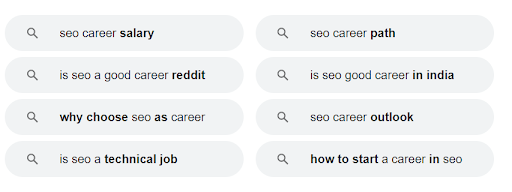When doing keyword research you may find various keywords that make sense and some do not. Keywords that do not match the grammatical factors cannot be regarded as phrases or questions.
You may find these types of keywords in Keyword Research Tools. But such keywords are to be targeted as they appear without modifying or presenting them as questions in the title tag.
Now the question arises “Should You Include The Exact Keywords in the Title Tag?” The simple answer is Yes and No, both. It depends on the type of keywords as well as the niche you are in.
Role of Search Intent
Search Intent plays an important role in the selection of keywords in 2022. If you are not able to satisfy the search intent, then there is no chance of ranking in the top 3 perhaps not even on page 1.
For instance when you search for “Men’s Shoes” you will see results for shoes for men and most websites are E-Commerce stores. Here Google focuses on intent after the Hummingbird algorithm update in 2010.
Now, if you are looking for WordPress Tutorial or How to use WordPress then you will almost see the same results on the SERPS and that’s because the intent behind searching the 2 terms is the same. You need not target the 2 keywords separately and with good optimization techniques, you can rank for both the keywords.
The search intent could be:
Informational
Whenever a user searches for information that could solve a simple or a complex problem is known as Informational Intent. This intent could be addressed with expertise and problem-solving skills which a content writer must have in 2022. More often informational keywords are long-tail known as Long Tail Keywords.
Navigational
This is a unique type of search intent. Search intent is said to be navigational if someone searches for specific brands or looking to purchase a product/service of a specific brand.
Commercial
Commercial intent is the intent that a customer has while searching for some products or services to buy. This is not exactly transactional intent but is considered a step before transactional activity.
Transactional
This type of intent is the most profitable one. It is a type of keyword that has high transactional intent to make a purchase online. But with the highest value, these keywords are highly competitive and could not be ranked with relevant backlinks.
Semantic Search Intent
This strategy is often looked upon. Semantic searches include different variations and related queries a user can have while searching for the primary keyword.
You can use these keywords/searches in the H2 headings of your content. These keywords retain users on the page and help reduce bounce rates.
You can pick the keywords at the bottom of the SERPs as Semantic Queries.

Use of Exact SEO Keywords
It confirmed that you do not need to use exact keywords in your SEO campaign, but it’s not the case always. You can use exact keywords in some places you have to such as Title Tag, Meta Descriptions, and if necessary.
Remember Google is an algorithm and it looks for specific keywords in the title and content of your pages. It’s often not that you’ll write “Quality Content” and outrank everybody.
Smartly, you can also use exact seo keywords as natural writing in content without exaggerating the term.
But do not forget that problem-solving content always wins with relevant images, external links, and videos.
For instance, in Google Ads, you have to use exact keywords in the title to rank better as it’s the basic thing all your competitors are doing.
Conclusion:
At last, you do and don’t need to include exact SEO Keywords in your strategy. But always remember to satisfy the search intent as best as possible. Helpful information keeps users on your page that may lead to future leads and eventually sales to your business. You may hire an Indian SEO Company like Percoyo to do the hard work for you.
